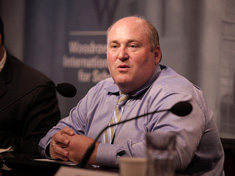-
Geoff Dabelko on Avoiding Conflict From Climate Adaptation
September 6, 2013 By Jacob Glass
Although major global action remains stymied in many respects, policymakers around the world are increasingly at least recognizing the need to increase resilience to the effects of climate change. But are the consequences from hastily implemented initiatives being adequately considered? Perhaps not.
Although major global action remains stymied in many respects, policymakers around the world are increasingly at least recognizing the need to increase resilience to the effects of climate change. But are the consequences from hastily implemented initiatives being adequately considered? Perhaps not.
“As we develop ways to respond to climate change, we need to go in with our eyes open and understand that there are ways to do that well and ways to do that poorly,” says former ECSP Director and current Director of Environmental Studies at Ohio University Geoff Dabelko in this week’s podcast. “If we do not get beyond our narrow, siloed approach to climate change…we can actually exacerbate existing lines of conflict or create ones that weren’t there before.”
For example, when the European Union mandated in 2008 that 10 percent of transportation fuels must be biofuel-based by 2020, the decision was initially lauded as an aggressive move to diversify transportation energy usage and curb CO2 emissions. But, Dabelko points out, the sudden demand for biofuels contributed to unforeseen environmental and social stressors, including a doubling of palm oil prices in Malaysia and Indonesia, which subsequently accelerated deforestation and ignited conflict associated with land usage.
Dabelko also calls out fellow Backdraft authors Stacy VanDeveer and Chad Briggs and their work on the implications of increased mineral demand in the “green” economy and scenario planning for climate risks.
Dabelko emphasizes that more cross-sectoral and forward-thinking approaches are needed to prevent destructive, unintentional outcomes of climate policy. “We think it’s critical to have these issues on the table upfront. Because if we don’t, and we pretend to be surprised when some of these interventions unwittingly or unexpectedly create problems in these other dimensions of conflict, then we really run the risk of undercutting both the larger rationale for making this transition, as well as potentially delegitimizing or undercutting specific tools for how to do it.”
Dabelko spoke at the Wilson Center on May 16 at the launch of ECSP’s report, Backdraft: The Conflict Potential of Climate Change Adaptation and Mitigation. Download his slides to follow along.
Friday podcasts are also available for download on iTunes.
Topics: adaptation, agriculture, biofuels, climate change, climate engineering, conflict, economics, energy, environment, environmental security, forests, Friday Podcasts, Indonesia, international environmental governance, land, Malaysia, military, minerals, natural gas, natural resources, podcast, risk and resilience, security
 A Publication of the Stimson Center.
A Publication of the Stimson Center.




